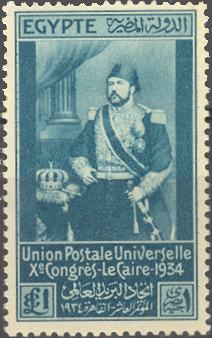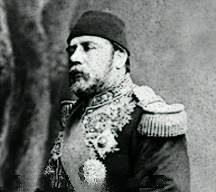 Ismail Pasha, Khedive of Egypt, was born at Cairo on January 31, 1830, the second of the three sons of Ibrahim and grandson of Mohammed Ali. Ismail died on March 21, 1895.
Ismail Pasha, Khedive of Egypt, was born at Cairo on January 31, 1830, the second of the three sons of Ibrahim and grandson of Mohammed Ali. Ismail died on March 21, 1895.
After receiving a European education in Paris, where he attended the Staff College, he returned home, and on the death of his elder brother became the heir to his Uncle, Said Mohammed, the vali of Egypt.
On the death of Said on January 18, 1863, Ismail was proclaimed Viceroy without opposition. He received £25,000,000 from the Egyptian cotton crop supplied in the American Civil War. In 1866 he obtained from the reigning Sultan of Turkey, Abd ul Aziz, in exchange for an increase in his tribute, firmans giving him the right of primogeniture in his family and in 1867 the title of Khedive, a Persian word meaning Prince or Sovereign and in 1873 the recognition of virtual independent sovereignty.
In spite of his vast schemes of reform and the éclat of European innovations, his oriental extravagance led to bankruptcy and European intervention in the internal affairs of Egypt. Yet in its earlier years much was done which seemed likely to give Ismail an important place in history.
He established and improved the administration system organised by Mohammed Ali which had fallen into decay after Abbas's indolent rule. He caused a thorough remodelling of the customs system, which was in an anarchic state, to be made by English officials.
In 1857 he bought the interpostal concession from Giacomo Muzzi, made him a Bey and appointed him the first Egyptian Postmaster General. In 1865 he established the Egyptian Post Office and then invited a number of the world's leading stamp printers to submit essays for adhesive stamps. He gave the contract to the Italian printers, Pellas Bros. of Genoa and the first stamps were placed on sale on January 1, 1866. He reorganised the military schools of his grandfather and gave some support to the cause of education. Railways, telegraphs, lighthouses; the harbour works at Suez and the breakwater at Alexandria were carried out by some of the best contractors of Europe. Most important of all, following the establishment of the Suez Canal company in 1856, he permitted Ferdinand De Lesseps to commence his construction work and to continue with it on March 19, 1866, when the Sultan of Turkey finally granted his sanction. The Suez Canal was opened on November 17, 1869, and the new town constructed in the centre of the Canal on the Great Bitter Lakes was named Ismailia to honour the Khedive.
 As a result of his administrative policies, however, the government debt had risen over thirty fold between 1863 and 1874. Eventually, as the government's financial situation worsened, and France and Great Britain realized the strategic importance of Egypt, they assumed control of Egyptian finances. Ismail was compelled to abdicate in favour of his son Muhammad Tawfik Pasha in 1879 and subsequently lived in exile abroad. He died at his palace near Constantinople.
As a result of his administrative policies, however, the government debt had risen over thirty fold between 1863 and 1874. Eventually, as the government's financial situation worsened, and France and Great Britain realized the strategic importance of Egypt, they assumed control of Egyptian finances. Ismail was compelled to abdicate in favour of his son Muhammad Tawfik Pasha in 1879 and subsequently lived in exile abroad. He died at his palace near Constantinople.The same portrait, as above, was also used on Bal. 92 (March 2, 1945), to mark the 50th Anniversary of the Death of Ismail Pasha; and he is also seen on Bal. 97 (February 28, 1946) using the same portrait from the lower values of the set marking the 10th Universal Postal Union, Cairo, from which the illustration above is taken